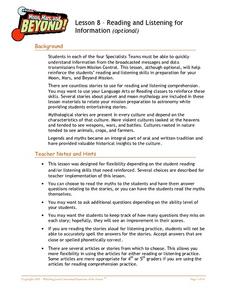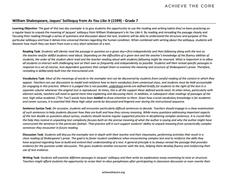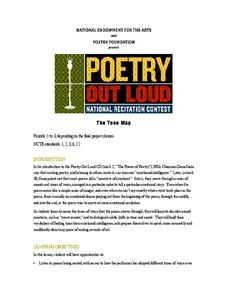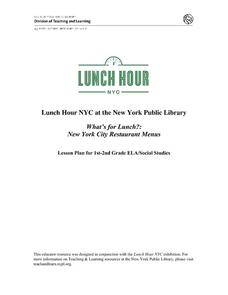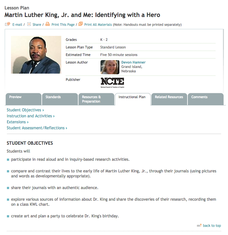Houghton Mifflin Harcourt
Problem Solvers: Extra Support Lessons (Theme 4)
When it comes to reading and understanding a text, sometimes readers need extra help. The third and final resource in a series of guides to accompany Theme 4: Problem Solvers provides additional activities to help struggling learners....
August House
The Great Smelly, Slobbery, Small-Tooth Dog
Read the story The Great Smelly, Slobbery, Small-Tooth Dog: A Folktale from Great Britain by Margaret Read MacDonald and choose from multiple activities to learn about the tale's theme—kindness. With so many options, your kind kids will...
Curated OER
Print & Go ESL
Improve reading comprehension with a set of ESL worksheets. Kids read through various passages, note which facts are true or false, mark their opinion on two statements, and write a short reply based on a writing prompt.
Museum of Disability
Don't Laugh at Me
You can prevent bullying in your classroom by addressing kindness, empathy, and acceptance with your littlest learners early on. After reading Don't Laugh at Me by Steve Seskin and Allen Shamblin, kids discuss the ways that words...
Student Achievement Partners
Eleven
Turning 11 comes with a range of emotions. Explore those emotions by reading the short story "Eleven" by Sandra Cisneros. Readers analyze the main character's reactions to the events of her day. Then, they write an essay describing what...
Curated OER
The No Thanksgiving Read Aloud
First graders investigate a story with the theme of The Thanksgiving holiday. The teacher reads the story to the class. The story is meant to help students to think of things they are thankful for. Students share the ideas in either...
Curated OER
Reading and Listening for Information
Students practice their reading and listening skills in order to obtains accurate information. In preparation for a Moon, Mars, and Beyond Mission project, they read short stories about planet and moon mythology then answer questions...
Curated OER
L.R.C. Learning Reading Comprehension
Students demonstrate comprehension of reading material. They preview questions and then read silently. Students answer questions and write a short summary of the text they read.
Curated OER
Shh! It's Reading Time!
Students observe and demonstrate how to read silently. They discuss the "Cross-Checking" strategy, select a book for independent reading, and demonstrate silent reading. Students write a summary of what they have read in their reading...
Curated OER
Building a Case for Clues
Here's a strategy that can be used with any narrative, whether read by the instructor or as independent reading. At the end of each chapter, learners predict, using prior knowledge as clues, what will happen in the next chapter. Readers...
Curated OER
The 5 W's
Examine how to answer who, what, when, where, and why when reading text. Young writers listen to the story Skeleton Hiccups, and as a class answer and discuss the five W's. Independently they read the story silently, and write the...
K12 Reader
Ride a Broom to the Moon
Your class can practice words that contain the long oo sound. Cool! Learners read a short poem that includes many examples of the oo digraph and then respond to three reading comprehension questions.
Curated OER
Guest Readers
Young readers explore reading comprehension by creating a class presentation. In this storytelling lesson, puils read an assigned text in class and analyze the characters, settings and story. They create an illustrated presentation in...
Curated OER
The Little Red Schoolhouse
Students read about the history of the one room school house and complete language arts activities to go with it. Students answer comprehension questions, role play, group discuss, and more.
Curated OER
Guided Imagery: Canyons, Chapter 8
Individuals use words or illustrate what they experience during a reading of a passage from chapter eight of Gary Paulsen's Canyons. Complete directions for the guided imagery exercise, and a suggested passage, are included with the...
Core Knowledge Foundation
Unit 1: Contemporary Fiction - They Call Me Güero: A Border Kid’s Poems by David Bowles
They Call Me Güero: A Border Kid's Poems by David Bowles is the focus of a five-week language arts unit unit. Fifth graders listen to various poems and participate in thoughtful discussions, examining vocabulary and learning new words in...
Curated OER
"As You Like It" by William Shakespeare
Jacque's soliloquy from Act II, scene ii of As You Like It sets the stage for a close reading exercise that models how to approach difficult, dense text and enables readers to practice reading comprehension and analysis...
Student Achievement Partners
Jacob and Wilhelm Grimm - "The Fisherman and his Wife"
Help young readers learn to read and interpret complex text independently. Teach young children to ask interpretive questions and use the text itself to answer them. Use art, word play and drama to provide a deeper understanding of...
Curated OER
Chrysanthemum
Our uniqueness should be celebrated, not teased. The story Chrysanthemum addresses having a distinct name and dealing with different perceptions. Pre- and post-reading questions are listed to help your learners understand...
Curated OER
The Tone Map
Poems are meant to be heard. Hearing a poem being read enriches one’s understanding of the tone and mood of the piece. Introduce your class to the sounds of poetry with a packet that not only details how to use poetry recordings in the...
New York Public Library
What's for Lunch?: New York City Restaurant Menus
Do you remember the days when a cup of coffee cost five cents? At A.W. Dennett restaurant in 1894, you could buy a five-cent cup of coffee and as well as a five-cent slice of pie to accompany it. The menu from that year is a primary...
Curated OER
Introduce Vocabulary: George's Store at the Shore (Bassede)
Combine counting and vocabulary using Francine Bassede's book George's Store at the Shore, which has learners exploring new words and numbers 1-10. Suggested words for this text are: arrange, assortment, customers,...
Florida Center for Reading Research
Comprehension: Text Analysis, Persuade, Inform, and Entertain Sort
Why do authors write? Practice determining the author's purpose with a categorizing activity. Learners sort twelve short passages into three categories: persuade, inform, and entertain.
ReadWriteThink
Martin Luther King, Jr. and Me: Identifying with a Hero
Here, young historians compare their early lives to that of Dr. Martin Luther King Jr.'s. They listen to a read aloud of a story by Dr. King's sister, and then write in the provided reflective journal template. Lastly, they share their...






